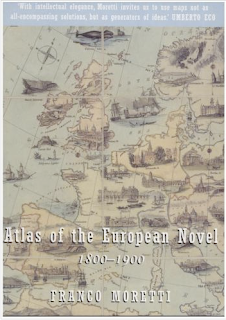Franco Moretti, Atlas of the European Novel 1800-1900
 If you haven't been introduced to the work of Franco Moretti or only vaguely know about his work, read this profile by Elif Batuman, which I've always thought is one of the best things n+1 has published and which could stand proudly alongside anything that Lingua Franca put out in its day.
If you haven't been introduced to the work of Franco Moretti or only vaguely know about his work, read this profile by Elif Batuman, which I've always thought is one of the best things n+1 has published and which could stand proudly alongside anything that Lingua Franca put out in its day.I don't want to analyze too much here Atlas of the European Novel (or Moretti's work in general) partly because I'm at work on a paper about him (once the paper's done, maybe I'll post some parts of it) but also in part because Moretti's needs, in a sense, to be shown before it can be critiqued. So I'd like to do just a bit of showing for now, although I think a few words of introduction are probably required.
Here's Moretti's rationale for the Atlas project: "geography is not an inert container, is not a box where cultural history 'happens', but an active force, that pervades the literary field and shapes it in depth. Making the connection between geography and literature explicit, then—mapping it: because a map is precisely that, a connection made visible—will allow us to see some significant relationships that have so far escaped us."
Puzzlingly, I think some people read a bold statement like that and simply can't get past the boldness—and this holds for both proponents and critics of Moretti—they find in its ambition an argument that has exactly this much complexity:
(Anyone from Stanford, I hope you like the cardinal red font!)
But note the last phrase of the quote—"some significant relationships that have so far escaped us." In some of Moretti's writings (particularly about the difference between close and distant reading), there is perhaps a greater degree of revolutionary zeal, but I think we strain too hard to eliminate the middle ground between instances of boldness and claims to Copernican import. At any rate, what is being summoned is not necessarily so epic as an awakening from our dogmatic slumbers as it is an idea that there are some forest-for-the-trees relationships that are obscured by the particular angle of vision that close reading in particular and exegetical activity in general obliges the scholar to take.And that is largely what Moretti delivers: most of the insights of the book are of very large scope and can be stated in a few words—they don't really even require their own commentary—and many cover ground that has already been conceptualized more abstractly (the mutually beneficial ideologies of the novel and the nation-state, the colonial romance's contributions to the dehumanization of native subjects). But the point is neither that Moretti's insights completely overturn established wisdom in every instance, nor that they reveal things we absolutely never knew before, but that they bring arguments about things like coloniality in fiction or the geographic imaginary of London to something like common ground—examining a map or a graph affords, I think, a different (tighter, more material, in a sense) kind of discursive focus that even a small chunk of the text (a paragraph, a couplet) does not.
But that is sort of anticipating my paper. Let me just allow Google Books to do what it does best: make available some actual pages of a book (please begin at the first full paragraph, although also please scroll back and read pp. 149-150 for a great justification of applying quantitative methods to the study of literature):
The quotes that I really want to highlight are at the bottom of page 157 ("Quantity affects form… because few foreign novels doesn't simply mean few foreign novels: it means that many great themes and techniques of the age… all of these are almost denied right of entry…") and the bottom of 160 ("Size affects formal variety—in the sense that it reduces variety.")
I think this is the perfect argument to be making about the paucity of translated novels in the United States and the lack of coverage given them by major review outlets: less is not just less of something, but is a different something. An undernourished person is not just a less healthy person, but is in an entirely different state altogether. It is not just that U.S. readers aren't treated to all of the great works of other languages and are therefore slightly deprived, but that the U.S. literature we do read is different (and less interesting) because of it.
Edit: Franco Moretti was featured last month on Wired, and someone makes the excellent point that an xkcd cartoon needs to be drawn about him, or about "Applying Quantitative Analysis to Classic Lit."

Comments
Much more interesting than Moretti's rather weak (and uninteresting in terms of computation) work.